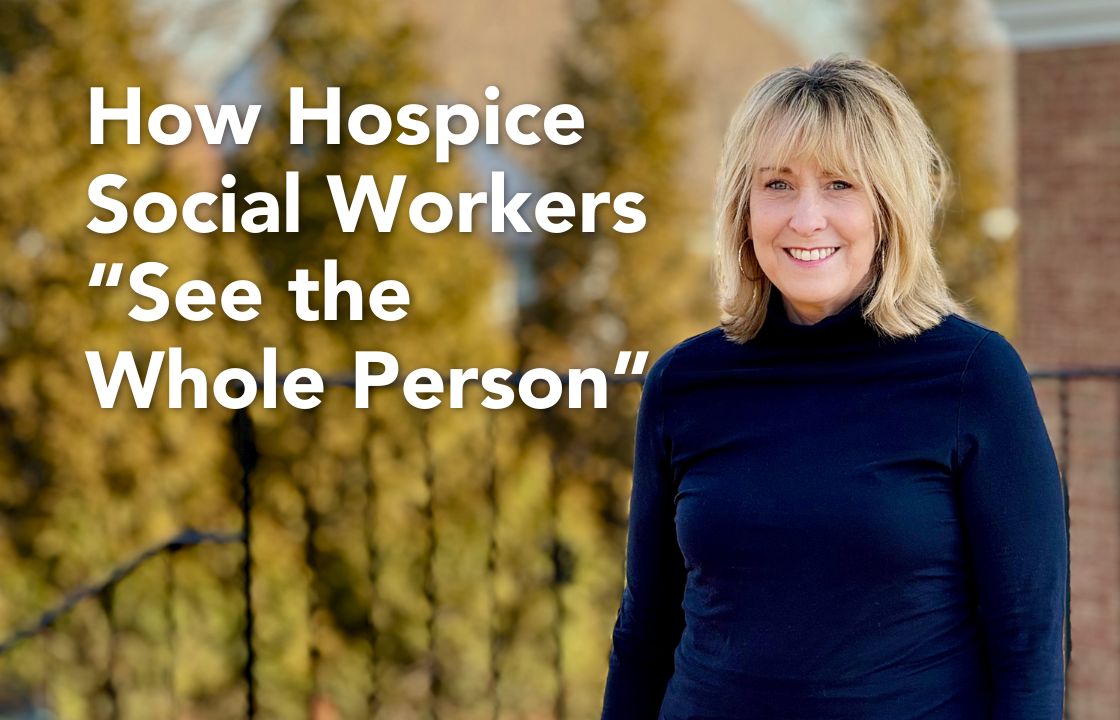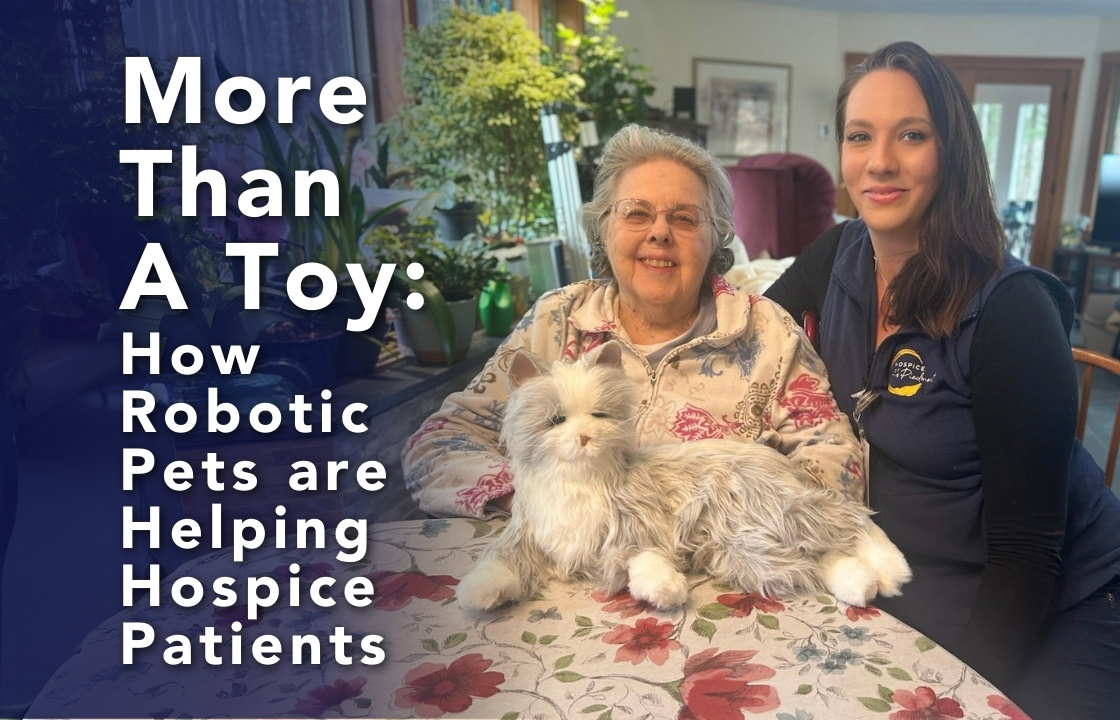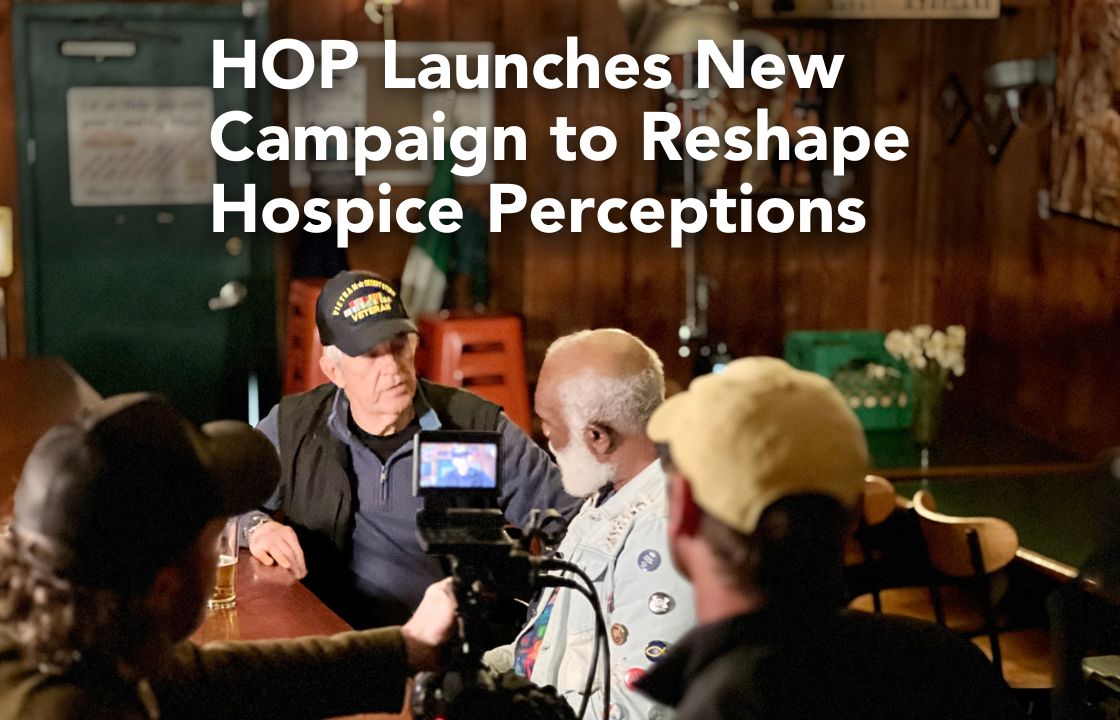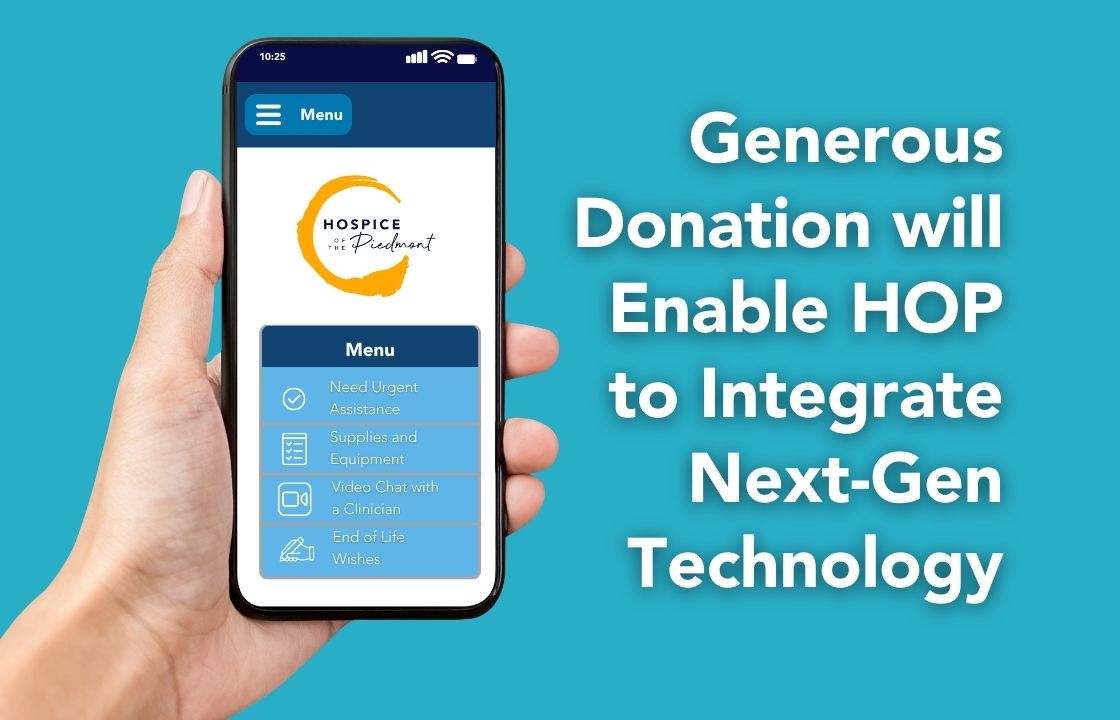“I always want to hear about our patient’s past. I want to understand who they are.”
Robin Johnson is a Hospice of the Piedmont Social Worker who’s been a part of our team for over 20 years.
“I was in a facility the other day,” she continues. “A man with Alzheimer’s was getting close to passing. There was a picture of him as a boy in overalls. He was probably about four, standing beside a sheep. It was a little farm scene. It just looked like something out of a magazine. I loved that.
“Then there’s another picture of him probably in his early 20s. He’s this handsome man in a Navy uniform. I’m just sitting by his bedside at night. It’s such an emotional moment to look at that whole life. It’s very impactful.”
—
As we commemorate Social Work Month, we thought we’d shine a spotlight on the indispensable role hospice social workers play in providing care that respects the full spectrum of a patient’s life. We sat down with Robin Johnson, one of the ten social workers on staff at Hospice of the Piedmont, to focus on the multifaceted role of hospice social workers and their unique contribution to the hospice care team.
Seeing the Whole Person
While our conversation with Robin covered many topics, one central theme rose above the rest. Robin says, “In our role, we look at people so broadly; we’re there to see the whole person.”
Hospice care is distinct from other forms of healthcare because of its holistic approach. Unlike traditional healthcare, which may focus on curing a disease or treating a specific body part, hospice care widens the aperture to see the whole person. This approach encompasses not just the physical symptoms of a disease but also the psychological, social, spiritual, and emotional needs of the patient and their family.
Social workers are critical to this holistic approach, not just because of how they get to know a patient, but also how they help facilitate conversations throughout the care team. “If I’m learning something relevant about a patient, I’m making sure the team – the chaplain, the nurse, the doctor, and the home health aide – are aware,” says Robin.
What Does a Hospice Social Worker Do?
Robins’s initial answer to the question, “What does a hospice social worker do?” is simple and also a little startling. “We look at a patient’s past, present, and future.” The first two parts of that answer are expected… but the “future?” You might want more information about that. We’ll get to it.
Understanding the Past
Recognizing that the initial decision to enroll in hospice can be psychologically jarring to a patient and family, Robin is intentional about when she makes her first visit. “As a social worker, I like to come a few days after admission when it’s a more relaxed setting, and you can have a more fluid conversation.”
When Robin meets a new patient and their family, she tries to gather a rich history about that person. She’s trying to “start piecing together their life, where they’ve been, and what matters to them.”
“It’s important to glean a good history from the family initially,” she says. “I especially want to hear from families of facility patients with dementia. I ask them to tell me as much about their life as possible. Then, I can use that in some little pieces of conversation. I’ve actually gotten some accurate responses from dementia patients because they can sometimes remember those long-ago details.”
Exploring the Present
One key responsibility for a social worker is to understand if the patient is getting the help they need. Often, that help comes from family members.
“It’s amazing how people respond when you just start inquiring about family,” explains Robin. “Do you feel you have enough support? Who’s supporting you? Is there anyone else coming in to assist? Who do you talk to when you’re feeling frustrated?”
Asking these questions helps a social worker understand if a patient needs additional help. Social workers are experts at navigating the labyrinth of healthcare and social services. So, it’s not just about identifying gaps but finding resources to close them.
Planning for the Future
One of the most surprising things to hear a Hospice Social Worker say is that they focus on “the future.” After all, doesn’t enrolling in hospice imply that a patient doesn’t have a lot of future to plan for?
Robin clarifies, “It’s important to talk about the future. How do they want these days to look going forward? What do they hope to see put in place for loved ones that they’re leaving behind? What legacy do they hope to leave? What things do they want to emphasize with loved ones for the future?”
Connecting with the Family
Connecting with the family and loved ones of the patient is another hospice social worker’s responsibility.
“There are times when I walk into a hospital room or a nursing home room, and somebody’s death is imminent,” explains Robin. “There’s family around, and it’s solemn. So, I start asking questions about the person. Then you get the family to bring up stories and memories, and they get laughing, and it’s very therapeutic. It can really change the feel of the room.”
Familial relationships can also be complex. As a hospice social worker, it’s Robin’s job to recognize what can and can’t be changed as we begin our last chapter.
“We can’t solve every family dynamic that’s been at play for 50 years. Maybe we can help them with a little conflict resolution or help bring them a little perspective. Still, it’s not our job to go in and remake a family.”
What Can a Hospice Social Worker Help With?
In addition to tending to patients’ and families’ emotional or “psycho-social” needs. Social workers are also experts in managing the myriad details accompanying us as we wind down our lives.
“Sometimes our work is just very practical stuff,” she says. Families may need help caring for a loved one, so social workers will provide a list of appropriate caregivers. Other times, they’ll be looking for additional financial support, so Robin helps with Medicaid applications.
Hospice can force people to have conversations they may have been putting off for years. “I have to be more direct with questions about Advance Directives, Power of Attorney, Do Not Resuscitate forms, and final arrangements,” says Robin.
But every family is different. “Some families are well supported, and you don’t do much. You help them with a couple of practical things like educating them about cremation providers, and they’re so happy to know about that,” she explains.
Being Present is Part of the Job
As you might imagine, the role of a hospice social worker often goes beyond referrals and paperwork. There are hard conversations to have. But, sometimes, the most important interactions don’t involve speaking at all.
“Often, it’s just sitting by the bedside and trying to have a little bit of a meaningful interaction with somebody,” says Robin.
“One of our Chaplains used the phrase ‘engaging in connection and care.’ And I like that.
“I’ll also call families and tell them I visited, especially if they’re in a nursing home. I can let them know that their loved one was content.
“My father was in a facility in Pennsylvania, and to have somebody call and say, ‘I sat with your dad today, and he seemed so content.’ That is so supportive. The family is so appreciative to know somebody went in and sat there.
“Sometimes I feel like, ‘Wow, am I really doing any social work here?’ But that’s the beauty of social work in hospice: just sitting with someone as a presence is valid work.”
Care Beyond the Life of the Patient
Hospice is not just about caring for patients. It’s also about caring for families. And that care extends beyond the life of the patient.
“Hospice social workers do condolence calls and occasionally a condolence visit,” explains Robin. “I had a patient pass recently. We’ve had this long history with him, and I’ve gotten to know the wife so well that I did a condolence visit with her.
“I find that people often want to talk about those last few days and what happened the day someone died. They’ll say, ‘I walked out, and then when I walked back in, and this is what I saw, and then this happened.’ People want to talk about it. And sometimes, they want to talk about that whole little scenario over and over again. And the average friend isn’t going to go in and say, ‘Tell me what that was like?’ Because people think we don’t need to talk about it. But the reality is that people want to talk about it. And so, as hospice professionals, we can facilitate that.”
The Big Picture: Your Life in Focus
In hospice, our objective is to know you beyond your illness. Our social workers are there to zoom in on the details that make you unique. From the defining moments of your past to how you’re managing the present and even envisioning the future you’ll leave behind, they expertly balance the practicalities of life’s end while staying sensitive to the emotional context of what that means to you and your family. As we celebrate Social Work Month, we’re honored to spotlight social workers’ invaluable role on our hospice care team.
To receive more information about how our hospice care team can support you or someone you love, click here to start the conversation.



